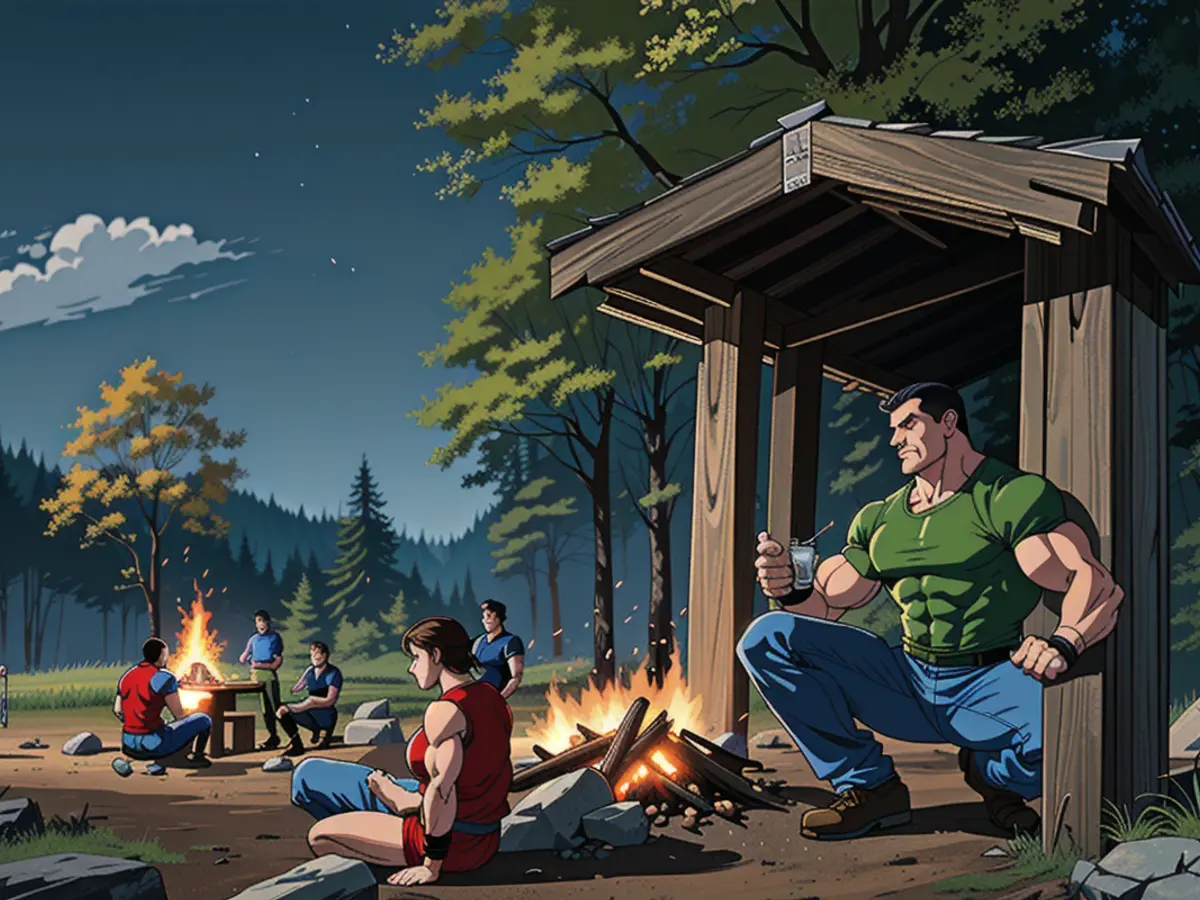Top Notch Camping Investment Opportunities to Explore in 2025
Before the onset of the COVID-19 pandemic, the National Park Service observed an ongoing annual increase in camping trips among Americans. However, the pandemic sparked a significant interest in outdoor activities, leading to a surge in camping. Young generations primarily drove this expansion, with billions of dollars expected to be spent annually on camping equipment in the upcoming years as these enthusiasts equip themselves for their journeys.
According to Dyrt's study, an estimated 84.8 million Americans went camping in 2023, with 5.5 million being first-time campers. This translates to more than 20 million new campers between 2021 and 2023. As per a 2023 Kampgrounds of America report, nearly 7 out of 10 U.S. households now consider themselves as campers, an uplift from 58% in 2014.
This trend could potentially be profitable for investors in the travel and retail sectors. Here are some top stocks in the camping industry:
Top camping stocks
Investing in top camping stocks in 2025
The best way to invest in the camping industry is through retailers and manufacturers that sell camping equipment. Major retailers like Walmart and Amazon have a significant presence in this consumer spending category. The RV industry also correlates with this sector, with Camping World Holdings being a prominent player as both an RV and camping equipment seller.
Here are five stocks to closely consider for 2025 and beyond:
| Company | Market Cap | Description ||---------------|------------|-----------------|| Dick's Sporting Goods (NYSE:DKS) | $18.13 billion | A leading omnichannel retailer for sports and outdoor equipment. || Deckers Outdoor (NYSE:DECK) | $31.74 billion | A holding company that manages shoe brands like Ugg, Hoka, Teva, and Sanuk. || Yeti Holdings (NYSE:YETI) | $3.60 billion | The maker of bags, coolers, and drinkware for outdoor enthusiasts. || Columbia Sportswear (NASDAQ:COLM) | $5.16 billion | Provides outerwear, apparel, accessories, and equipment for adventurous types. || Johnson Outdoors (NASDAQ:JOUT) | $390.60 million | A diversified manufacturer of outdoor equipment and vehicles. |
1. Dick's Sporting Goods
1. Dick's Sporting Goods
Dick's Sporting Goods saw significant growth as a result of the resurgence in outdoor travel and experiences in recent years.
Operating as a mid-sized retailer improving its operations for the digital age before 2020, the company capitalized on reaching consumers through both its stores and website when the pandemic hit, leading to a boost in purchases for outdoor adventures. Dick's transformed from a struggling stock to a high-flying one, achieving a return of nearly 200% from both share price appreciation and dividend payment in 2020 and 2021.
Looking back over a three-year period, 2021 to 2024, the stock returned more than 130% due to share price appreciation and dividend growth. Dick's offers a wide range of apparel and equipment for various outdoor activities, with a steady increase in digital sales as consumers make more online purchases.
$18.13 billion
Dick's extensive store base gives it an advantage in this area, serving as both a fulfillment center (including same-day store pickup) and a return location for customers. In the first nine months of 2024, Dick's reported net sales of $9.6 billion and net income of $865 million, representing increases of 4.8% and 15% respectively compared to the first nine months of 2023, thanks to its robust omnichannel strategy.
With millions of new athletes, Dick's believes its customer engagement and diversified business model can drive steady sales growth in the future. This is an opportunity potential investors may be interested in joining.
A top omnichannel retailer for sports and other outdoor equipment.
Same-Store Sales
A metric used by retail companies to measure the growth in revenue from stores that have been in operation for at least one year. ## 2. Deckers Outdoor
2. Deckers Outdoor
Deckers Outdoor may not be the best choice for hiking in Ugg boots, but for those who prefer "glamping" (a mixture of "glamorous" and "camping"), Ugg could be considered a fashion statement. For trail hiking and enduring long excursions, Hoka, the running and hiking shoe company, can be a better option. Both brands are managed by Deckers Outdoor.
$31.74 billion
Like other apparel and accessory companies, Deckers has benefited from the recent boost in outdoor activities. Combining Teva and Sanuk footwear brands, Deckers offers a shoe for almost every excursion imaginable.
In the initial half of its financial year 2025, Deckers recorded a net sales of $2.1 billion, marking a significant 21% increase compared to the same period in its financial year 2024. The company also reported a substantial net income of $358 million during this six-month span, which marked a noteworthy 48% rise from the previous year. Deckers appears to be constructing a modest footwear authority that merits close surveillance.
A holding company that owns shoe brands Ugg, Hoka, Teva, and Sanuk.
Yeti Holdings
Yeti Holdings
Following its successful initial public offering (IPO) a few years ago, Yeti emerged as an impressive growth story. The stock experienced a remarkable doubling in value from its public launch in late 2018 until the end of 2019. Although the pandemic temporarily affected the company, sales saw a further surge as campers began purchasing new bags, coolers, and travel drinkware.
A considerable portion of Yeti's success isn't just due to its products; it's also the business model. More than half of its revenue stems from direct-to-consumer channels such as online sales or orders shipped directly to the customer. This manufacturing-retailing model results in an above-average operational profit margin (17% on an adjusted basis) compared to a traditional retailing model, which generally falls within the single-digit percentage range.
$3.60 billion
Yeti's net sales registered a 10% year-on-year increase to $478.4 million in the third quarter of 2024. By sales segment, Coolers & Equipment net sales climbed by 12%, Drinkware net sales rose by 9%, Wholesale net sales increased by 14%, and Direct-to-Consumer net sales rose by 8%. By region, international net sales soared by 30%, and U.S. net sales increased by 7%.
Beyond being a leading outdoor equipment manufacturer, Yeti stock could hold promise as a long-term investment in a consumer brand growth narrative.
The bag, cooler, and drinkware maker for outdoors enthusiasts.
Columbia Sportswear
Columbia Sportswear
The apparel sector was severely impacted by COVID-19 in 2020. With many individuals confined at home for parts of the year, new clothes ranked low on many consumer shopping lists. It took time for consumers to revamp their wardrobes once again. Outerwear, clothing, and equipment company Columbia Sportswear was no exception to the challenges faced by the industry.
Columbia (along with its subsidiary brands Mountain Hardwear, Sorel, and prAna) specializes in providing comfortable gear suitable for outdoor enthusiasts, making it a desirable category of clothing for campers and vacationers. For investors following its long-term growth and income story, the company experienced a strong comeback in 2021 and 2022.
$5.16 billion
The past few years have been a more challenging period for the company, with North American consumer spending patterns remaining uncertain. Despite this, in the first nine months of 2024, net sales decreased by 5% to $931.8 million. The company's gross margin expanded by 150 basis points to 50.2% of net sales, while operating income fell by 16% from the previous year, still totaling $112.5 million. The company concluded the period with $373.9 million in cash and investments, with no borrowings.
While growth has been uneven in recent financial reports, Columbia Sportswear stock recently reached a new 12-month high, indicating that some investors may be optimistic about its growth prospects. The company also pays a modest dividend, offering a yield of roughly 1.4% at the time of writing, equating to an annual dividend of $1.20 per share. Investors with a long-term focus may want to take another look.
Outerwear, apparel, accessories, and equipment for adventurous types.
Johnson Outdoors
Johnson Outdoors
Camping and outdoor activities are all about the experience, and high-quality experiences are a top theme in leisure travel for consumers. Johnson Outdoors plays a crucial role in this arena, operating in four segments — fishing, diving, camping, and watercraft recreation — and managing brands such as Eureka!, Jetboil, Scubapro, Humminbird, and Ocean Kayak.
Due to the competitiveness of its operating environment and rapidly evolving consumer spending patterns, this stock may occasionally exhibit severe volatility. Johnson Outdoors has also seen mixed growth recently due to challenges within the industry.
$390.60 million
In fiscal 2024, the company's total revenue decreased by 11% to $592.8 million, and it reported a net loss for the 12-month period. On a more positive note, the company reported an increase of $9.5 million in cash and investments at the end of the fiscal year, with no debt on its balance sheet.
For investors with a high tolerance for risk, this small-growth company could be worth considering within the camping stock universe.
A diversified outdoor equipment and vehicle manufacturer.
But the stocks listed here operate in a fluctuating sector that's sensitive to consumer spending fluctuations, so keep in mind that prices can experience significant swings. It's essential to put money into corporations you think have a sustained edge in the camping and outdoor sector, and stick with it for an extended period.
Previously serving as CEO of Whole Foods Market, which is now an Amazon subsidiary, is John Mackey. He's a member of Our Website's board of directors. As for Rachel Warren, she holds positions in Amazon. Our Website holds stocks in and advocates for Amazon, Deckers Outdoor, and Walmart. Mentioning Camping World, Our Website also strongly suggests it. Our Website has a transparent disclosure policy.
Given the context of the text, here are two sentences that contain the words 'finance', 'investing', and 'money':
Investors might find potential profits in the travel and retail sectors due to the increasing trend in camping. To maximize returns, considering investments in retailers and manufacturers of camping equipment could be beneficial.
According to the study, budgets for camping equipment are expected to reach billions of dollars annually, suggesting an opportunity for those interested in finance and investing in this sector.






